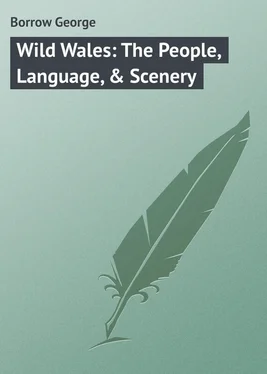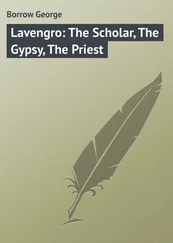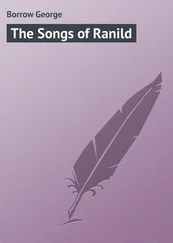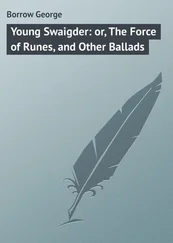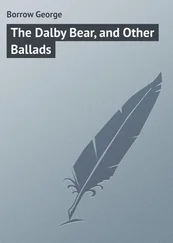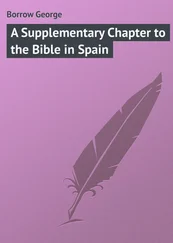George Borrow - Wild Wales - The People, Language, & Scenery
Здесь есть возможность читать онлайн «George Borrow - Wild Wales - The People, Language, & Scenery» — ознакомительный отрывок электронной книги совершенно бесплатно, а после прочтения отрывка купить полную версию. В некоторых случаях можно слушать аудио, скачать через торрент в формате fb2 и присутствует краткое содержание. Жанр: foreign_prose, Путешествия и география, на английском языке. Описание произведения, (предисловие) а так же отзывы посетителей доступны на портале библиотеки ЛибКат.
- Название:Wild Wales: The People, Language, & Scenery
- Автор:
- Жанр:
- Год:неизвестен
- ISBN:нет данных
- Рейтинг книги:5 / 5. Голосов: 1
-
Избранное:Добавить в избранное
- Отзывы:
-
Ваша оценка:
- 100
- 1
- 2
- 3
- 4
- 5
Wild Wales: The People, Language, & Scenery: краткое содержание, описание и аннотация
Предлагаем к чтению аннотацию, описание, краткое содержание или предисловие (зависит от того, что написал сам автор книги «Wild Wales: The People, Language, & Scenery»). Если вы не нашли необходимую информацию о книге — напишите в комментариях, мы постараемся отыскать её.
Wild Wales: The People, Language, & Scenery — читать онлайн ознакомительный отрывок
Ниже представлен текст книги, разбитый по страницам. Система сохранения места последней прочитанной страницы, позволяет с удобством читать онлайн бесплатно книгу «Wild Wales: The People, Language, & Scenery», без необходимости каждый раз заново искать на чём Вы остановились. Поставьте закладку, и сможете в любой момент перейти на страницу, на которой закончили чтение.
Интервал:
Закладка:
I went up the field with the lane on my right, down which ran a runnel of water, from which doubtless the house derived its name. I soon came to an unenclosed part of the mountain covered with gorse and whin, and still proceeding upward reached a road, which I subsequently learned was the main road from Llangollen over the hill. I was not long in gaining the top, which was nearly level. Here I stood for some time looking about me, having the vale of Llangollen to the north of me, and a deep valley abounding with woods and rocks to the south.
Following the road to the south, which gradually descended, I soon came to a place where a road diverged from the straight one to the left. As the left-hand road appeared to lead down a romantic valley I followed it. The scenery was beautiful – steep hills on each side. On the right was a deep ravine, down which ran a brook; the hill beyond it was covered towards the top with a wood, apparently of oak, between which and the ravine were small green fields. Both sides of the ravine were fringed with trees, chiefly ash. I descended the road which was zig-zag and steep, and at last arrived at the bottom of the valley, where there was a small hamlet. On the farther side of the valley to the east was a steep hill on which were a few houses – at the foot of the hill was a brook crossed by an antique bridge of a single arch. I directed my course to the bridge, and after looking over the parapet, for a minute or two, upon the water below, which was shallow and noisy, ascended a road which led up the hill: a few scattered houses were on each side. I soon reached the top of the hill, where were some more houses, those which I had seen from the valley below. I was in a Welsh mountain village, which put me much in mind of the villages which I had strolled through of old in Castile and La Mancha; there were the same silence and desolation here as yonder away – the houses were built of the same material, namely stone. I should perhaps have fancied myself for a moment in a Castilian or Manchegan mountain pueblicito, but for the abundance of trees which met my eyes on every side.
In walking up this mountain village I saw no one, and heard no sound but the echo of my steps amongst the houses. As I returned, however, I saw a man standing at a door – he was a short figure, about fifty. He had an old hat on his head, a stick in his hand, and was dressed in a duffel great coat.
“Good day, friend,” said I; “what may be the name of this place?”
“Pont Fadog, sir, is its name, for want of a better.”
“That’s a fine name,” said I; “it signifies in English the bridge of Madoc.”
“Just so, sir; I see you know Welsh.”
“And I see you know English,” said I.
“Very little, sir; I can read English much better than I can speak it.”
“So can I Welsh,” said I. “I suppose the village is named after the bridge.”
“No doubt it is, sir.”
“And why was the bridge called the bridge of Madoc?” said I.
“Because one Madoc built it, sir.”
“Was he the son of Owain Gwynedd?” said I.
“Ah, I see you know all about Wales, sir. Yes, sir; he built it, or I dare say he built it, Madawg ap Owain Gwynedd. I have read much about him – he was a great sailor, sir, and was the first to discover Tir y Gorllewin, or America. Not many years ago his tomb was discovered there with an inscription in old Welsh – saying who he was, and how he loved the sea. I have seen the lines which were found on the tomb.”
“So have I,” said I; “or at least those which were said to be found on a tomb: they run thus in English: —
“‘Here, after sailing far, I, Madoc, lie,
Of Owain Gwynedd lawful progeny:
The verdant land had little charms for me;
From earliest youth I loved the dark-blue sea.’”
“Ah, sir,” said the man, “I see you know all about the son of Owain Gwynedd. Well, sir, those lines, or something like them, were found upon the tomb of Madoc in America.”
“That I doubt,” said I.
“Do you doubt, sir, that Madoc discovered America?”
“Not in the least,” said I; “but I doubt very much that his tomb was ever discovered with the inscription which you allude to upon it.”
“But it was, sir, I do assure you, and the descendants of Madoc and his people are still to be found in a part of America speaking the pure iaith Cymraeg better Welsh than we of Wales do.”
“That I doubt,” said I. “However, the idea is a pretty one; therefore cherish it. This is a beautiful country.”
“A very beautiful country, sir; there is none more beautiful in all Wales.”
“What is the name of the river, which runs beneath the bridge?”
“The Ceiriog, sir.”
“The Ceiriog,” said I; “the Ceiriog!”
“Did you ever hear the name before, sir?”
“I have heard of the Eos Ceiriog,” said I; “the Nightingale of Ceiriog.”
“That was Huw Morris, sir; he was called the Nightingale of Ceiriog.”
“Did he live hereabout?”
“O no, sir; he lived far away up towards the head of the valley, at a place called Pont y Meibion.”
“Are you acquainted with his works?” said I.
“O yes, sir, at least with some of them. I have read the Marwnad on Barbara Middleton; and likewise the piece on Oliver and his men. Ah, it is a funny piece that – he did not like Oliver nor his men.”
“Of what profession are you?” said I; “are you a schoolmaster or apothecary?”
“Neither, sir, neither; I am merely a poor shoemaker.”
“You know a great deal for a shoemaker,” said I.
“Ah, sir; there are many shoemakers in Wales who know much more than I.”
“But not in England,” said I. “Well, farewell.”
“Farewell, sir. When you have any boots to mend, or shoes, sir – I shall be happy to serve you.”
“I do not live in these parts,” said I.
“No, sir; but you are coming to live here.”
“How do you know that?” said I.
“I know it very well, sir; you left these parts very young, and went far away – to the East Indies, sir, where you made a large fortune in the medical line, sir; you are now coming back to your own valley, where you will buy a property, and settle down, and try to recover your language, sir, and your health, sir; for you are not the person you pretend to be, sir; I know you very well, and shall be happy to work for you.”
“Well,” said I, “if I ever settle down here, I shall be happy to employ you. Farewell.”
I went back the way I had come, till I reached the little hamlet. Seeing a small public-house, I entered it – a good-looking woman, who met me in the passage, ushered me into a neat sanded kitchen, handed me a chair and inquired my commands; I sat down, and told her to bring me some ale; she brought it, and then seated herself by a bench close by the door.
“Rather a quiet place this,” said I. “I have seen but two faces since I came over the hill, and yours is one.”
“Rather too quiet, sir,” said the good woman; “one would wish to have more visitors.”
“I suppose,” said I, “people from Llangollen occasionally come to visit you.”
“Sometimes, sir, for curiosity’s sake; but very rarely – the way is very steep.”
“Do the Tylwyth Teg ever pay you visits?”
“The Tylwyth Teg, sir?”
“Yes; the fairies. Do they never come to have a dance on the green sward in this neighbourhood?”
“Very rarely, sir; indeed, I do not know how long it is since they have been seen.”
“You have never seen them?”
“I have not, sir; but I believe there are people living who have.”
“Are corpse candles ever seen on the bank of that river?”
“I have never heard of more than one being seen, sir, and that was at a place where a tinker was drowned a few nights after – there came down a flood, and the tinker in trying to cross by the usual ford was drowned.”
Читать дальшеИнтервал:
Закладка:
Похожие книги на «Wild Wales: The People, Language, & Scenery»
Представляем Вашему вниманию похожие книги на «Wild Wales: The People, Language, & Scenery» списком для выбора. Мы отобрали схожую по названию и смыслу литературу в надежде предоставить читателям больше вариантов отыскать новые, интересные, ещё непрочитанные произведения.
Обсуждение, отзывы о книге «Wild Wales: The People, Language, & Scenery» и просто собственные мнения читателей. Оставьте ваши комментарии, напишите, что Вы думаете о произведении, его смысле или главных героях. Укажите что конкретно понравилось, а что нет, и почему Вы так считаете.
